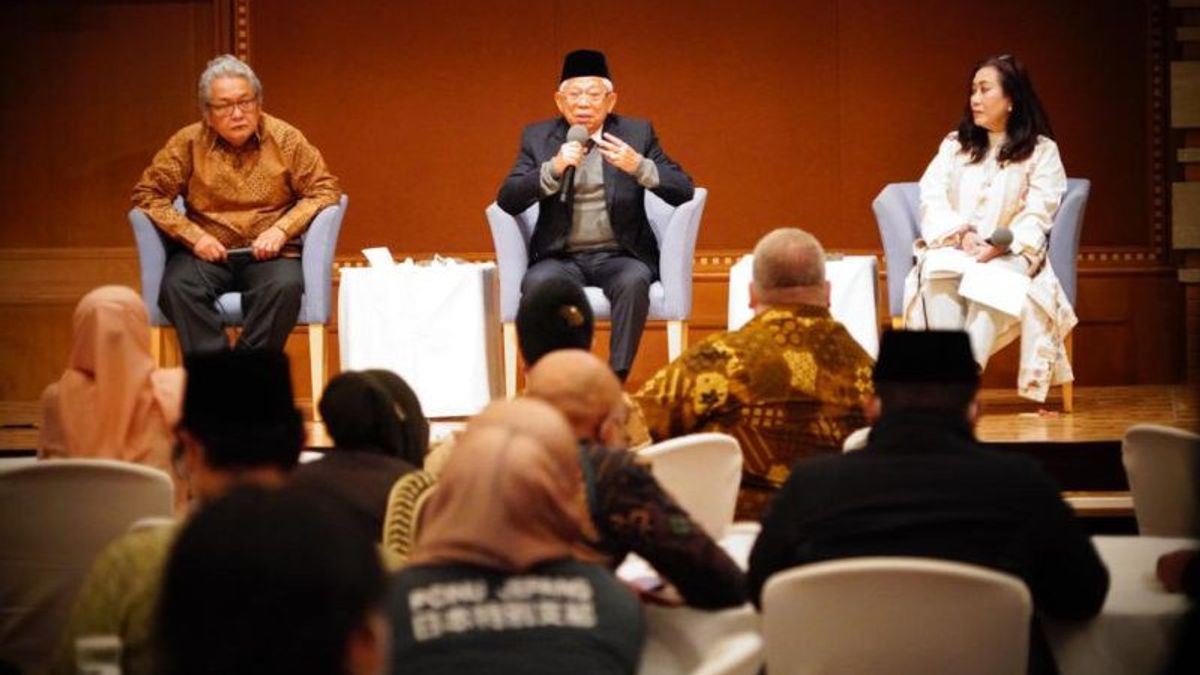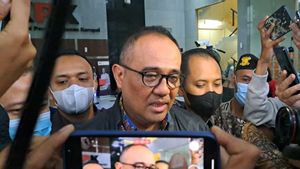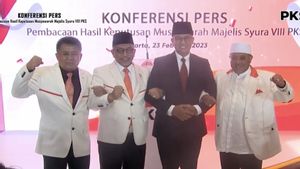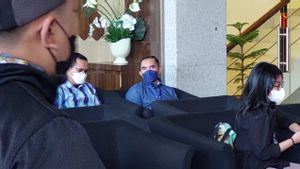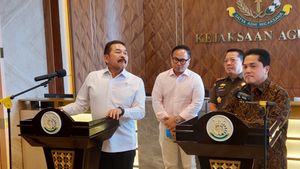JAKARTA - Vice President (Wapres) Ma'ruf Amin emphasized that the government is committed to instilling Pancasila education in Indonesian citizens (WNI) abroad.
This was conveyed by the Vice President during a dialogue with the Indonesian diaspora in Japan in the National Dialogue forum which took place at the Imperial Osaka Hotel, Japan, Monday, March 6 evening.
In that forum a participant, namely a priest named Ayub Mbuilima, asked the Vice President a question about the government's efforts to instill Pancasila education in Indonesian citizens abroad, especially children of the nation who were born and live abroad.
"Do the President and the Vice President have plans to prepare a Pancasila education program for those of us who migrate (abroad), specifically for children who may be born here, as Indonesian citizens so that they (understand) Pancasila as well, (so) become a strength for their growth,” asked Ayub.
Answering this question, the Vice President emphasized that the government has a big commitment to socialize the practice of Pancasila values for all Indonesian citizens, both at home and abroad.
Therefore, the government has also formed the Pancasila Ideology Development Agency (BPIP) with the 5th President of the Republic of Indonesia Megawati Soekarnoputri as Chair of the Steering Committee, to teach or disseminate, as well as instill Pancasila values.
"Not doctrinal, but (so that) it is truly understood in order to be implemented for all sectors," he explained.
Not only that said the Vice President, but BPIP was also tasked with evaluating various ministry and agency programs so that they were in line with Pancasila values.
SEE ALSO:
The socialization of Pancasila to Indonesian citizens abroad is not only carried out by the Government, but also by the People's Consultative Assembly (MPR).
"The planting of a national consensus on the foundations of the country was (also) carried out by the leadership of the MPR who also often went abroad (to socialize) the four pillars (of nationality) including Pancasila, the 1945 Constitution, the Unitary State of the Republic of Indonesia, and Bhinneka Tunggal Ika," he said.
Apart from that, said the Vice President, various other institutions and community organizations (organizations) were also involved in efforts to instill Pancasila values, one of which was the Forum for Religious Harmony (FKUB) which was tasked with guarding religious tolerance in the country mandated by Pancasila.
Furthermore, the Vice President emphasized that rules and regulations related to Pancasila education have been included in the Indonesian national education system.
However, according to him, how far the results of the influence and impact of Pancasila education on people's lives both at home and abroad will continue to be evaluated.
"These national issues have been resolved politically, but implementation still needs to be worked on, that's why there is a BPIP (as) a presidential institution whose duties are not only in the country, but also abroad," explained the Vice President.
"I think that's the problem, the provisions or policies have been taken comprehensively and several institutions have also been held both for the community and in the education sector," he added.
In line with the Vice President, the Indonesian Ambassador to Japan Heri Akhmadi added that information related to Pancasila education can be accessed by Indonesian citizens, especially those in Japan, through the Republic of Indonesia School in Tokyo, which since 2021 lessons can be accessed online.
"In our national education system there are five compulsory subjects, namely religion, and character, Pancasila and citizenship, Indonesian, then mathematics and science," he explained.
But mathematics and science, said Heri, were not included in the RI Tokyo School because they could be taken at Japanese schools.
“But the 3 (others) have been prepared online. So fathers and mothers who have sons and daughters here, who wish to take those subjects or courses can go through distance education held by the Republic of Indonesia School in Tokyo," he said.
Until now, according to Heri, many Indonesian citizens in Japan have attended the RI Tokyo School online, including Indonesian citizens in Taiwan and South Korea.
"Tokyo was assigned to cover East Asia as well, so we hope that this can be put to good use," he said.
Accompanying the Vice President at the event were Wury Ma'ruf Amin's wife, Head of the Secretariat of the Vice President Ahmad Erani Yustika, Deputy for Economic Policy Support and Increased Competitiveness Guntur Iman Nefianto, Deputy for Administration Sapto Harjono Wahjoe Sedjati, Director General for Protocol and Consular/Head of Protocol Country Andy Rachmianto.
Apart from that, the Special Staff of the Vice President include Masykuri Abdillah, Masduki Baidlowi, and Zumrotul Mukaffa, Expert Team of Vice President Farhat Brachma, and Plt. Taufik Hidayat, Executive Director of the National Sharia Economy and Finance Committee.
The English, Chinese, Japanese, Arabic, and French versions are automatically generated by the AI. So there may still be inaccuracies in translating, please always see Indonesian as our main language. (system supported by DigitalSiber.id)
